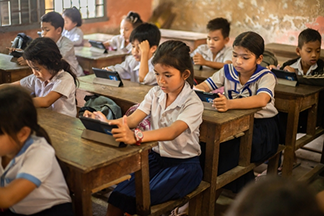Learning Effectiveness
Our flagship service Think!Think! has been proven through empirical studies to be effective in improving mathematical achievement, IQ, and non-cognitive skills.
A collaborative empirical study with JICA (Japan International Cooperation Agency) and Keio University demonstrated that children who used Think!Think! for three months achieved substantially greater gains in math performance and IQ than the control group, while also showing statistically significant improvements in non-cognitive skills.
Academic Performance
+
5.6
pts *
TIMSS
(Trends in International Mathematics and Science Study)
IQ
+
7.0
pts *
IQ test (Tanaka B) in Cambodia
Non-cognitive Skills
Positive impact on Confidence and Motivation **
*Children who used Think!Think! achieved standardized test scores that were on average 0.56 standard deviations higher on TIMSS and 0.70 standard deviations higher on IQ scores compared to children who did not use the application. These correspond to improvements of approximately 5.6 points and 7.0 points respectively in deviation score terms.(Ito et al., 2019)
**Positive effects were measured after a period of eight months following Think!Think! usage.(Nakamuro et al., 2020)
**Positive effects were measured after a period of eight months following Think!Think! usage.(Nakamuro et al., 2020)
Additionally, the gains in math performance and IQ scores were evident across all demographic groups—irrespective of gender, grade level, or parental education level— indicating that the benefits extend to diverse populations of children, not just select groups.


Gender

Grade Level

Parents' Education

Think!Think! Empirical Study Overview
Location: Cambodia
Participants: 1,636 children (Grades 1-4)
Evaluation Period: 3 months (followed by 8-month follow-up study)
Methodology: RCT (Randomized Controlled Trial)
External Evaluation: Nakamuro Laboratory, Keio University
Participants: 1,636 children (Grades 1-4)
Evaluation Period: 3 months (followed by 8-month follow-up study)
Methodology: RCT (Randomized Controlled Trial)
External Evaluation: Nakamuro Laboratory, Keio University

Professor Makiko Nakamuro
Publications:
"Gakuryoku no Keizaigaku" (The Economics of Academic Achievement)
"Kagakuteki Konkyo de Kosodate: Kyoiku Keizaigaku no Saizensenin" (Evidence-Based Parenting: The Forefront of Educational Economics)
"Gakuryoku no Keizaigaku" (The Economics of Academic Achievement)
"Kagakuteki Konkyo de Kosodate: Kyoiku Keizaigaku no Saizensenin" (Evidence-Based Parenting: The Forefront of Educational Economics)
For detailed information, please refer to the research findings below.
・Ito, H., Kasai, K., Nakamuro, M. (2019). Does computer-aided instruction improve children’s cognitive and non-cognitive skills?: Evidence from Cambodia. RIETI Discussion Paper Series 19-E-040
・Nakamuro, M., Ito, H. (2020). The Effect of Computer Assisted Learning on Children’s Cognitive and Non-cognitive Skills: Evidence from a Randomized Experiment in Cambodia. RIETI Discussion Paper Series 20-E-074
・Ito, H., Kasai, K., Nakamuro, M. (2019). Does computer-aided instruction improve children’s cognitive and non-cognitive skills?: Evidence from Cambodia. RIETI Discussion Paper Series 19-E-040
・Nakamuro, M., Ito, H. (2020). The Effect of Computer Assisted Learning on Children’s Cognitive and Non-cognitive Skills: Evidence from a Randomized Experiment in Cambodia. RIETI Discussion Paper Series 20-E-074
These results demonstrate exceptionally high effectiveness compared to other similar initiatives worldwide, supporting our hypothesis that "drawing out children's intellectual curiosity"—which we hold dear—ultimately leads to improvements in fundamental abilities.
Of course, evidence such as test scores and statistical data alone cannot capture every aspect of each child's individual changes and growth. While we learn from and utilize evidence, we do not rely solely on it. Centering on children's "curiosity," we continue to ask what truly meaningful experiences are for children, paying attention to changes that are difficult to quantify and growth that is challenging to measure.
Of course, evidence such as test scores and statistical data alone cannot capture every aspect of each child's individual changes and growth. While we learn from and utilize evidence, we do not rely solely on it. Centering on children's "curiosity," we continue to ask what truly meaningful experiences are for children, paying attention to changes that are difficult to quantify and growth that is challenging to measure.
<Related Information>
Company Press Release
Khmer Times: Think!Think!: Primary students get their Math ‘study buddy’
*Note: "Hanamaru Lab" and "WonderLab" mentioned in these materials are former names of the company.